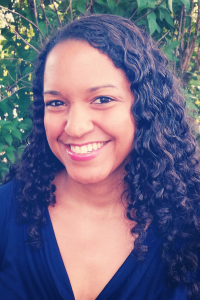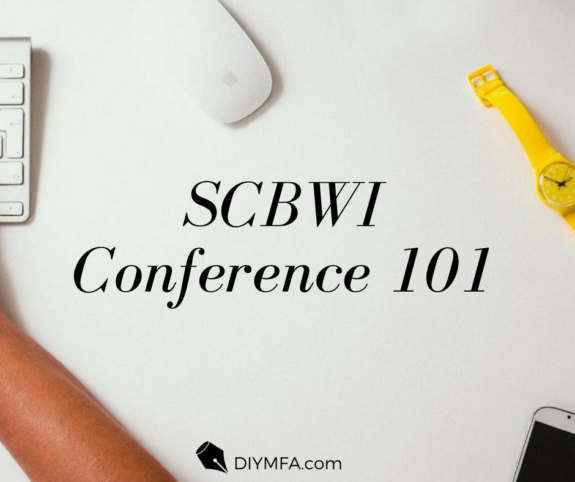If you’ve read DIY MFA or have been following this website for a while, you know how important community is for writers. You need to find readers for your stories, but it’s also incredibly valuable to find other writers who write the same kinds of books as you. If you’re a kid lit writer (or illustrator), the best place to find that community is by joining the Society of Children’s Books Writers and Illustrators (SCBWI). This organization has been around for over 40 years, and now has 100 chapters around the world and over 20,000 members. It’s the perfect place to start if you’re looking to build your kid lit community. I’ve been a member for about 8 years, during which time I’ve met many writer friends, and connected with two different critique groups.
You can explore SCBWI’s website to learn more and become a member. For this article, I’m going to talk about a highlight of the organization: SCBWI conferences.
SCBWI has two national conferences – one in LA and one in NYC – and many smaller regional conferences around the world throughout the year. I’ve been to each of the national conferences, as well as the New Jersey and New England chapter conferences.
Why Attend an SCBWI Conference?
Networking
My favorite part of SCBWI conferences is the opportunity to spend time with other kid lit writers. Writing is solitary by nature, so it’s nice to step away from your laptop for a couple of days and hang out with other writers who get what you’re doing–whether you’re brand new to writing, already published, or somewhere in between. There are other ways to make these connections, of course. Social Media is great for that. But it’s especially nice to chat face-to-face. As a kid lit writer, attending an SCBWI conference where everyone in attendance either writes or illustrates stories for children only increases the feeling of camaraderie.
Conferences are also great places to meet agents and editors, and get a sense of whether you’d like to work with them if given the chance. When putting together my agent list before querying, I included several agents I’d met or heard speak at conferences, because I liked what they had to say and could tell I’d work well with them. At some conferences, you can pitch to agents or editors, or receive feedback on manuscript pages. As a bonus, most agents and editors invite attendees to submit to them (using a specific email subject line) for a period of time after the conference ends, which increases the chances of your manuscript getting noticed within the slush pile.
Inspiration & Knowledge
Real talk: writing is hard. It takes a lot of work and it can be easy to get discouraged on difficult writing days, or in the midst of rejection. Conferences provide much-needed inspiration. I’ve gotten the chance to see many authors I admire speak at conferences: Laurie Halse Anderson, Kate DiCamillo, Jane Yolen, R.L. Stine, and Libba Bray, to name a few. It’s impossible to hear these amazing authors speak and not feel invigorated and motivated. Having these inspirational boosts once a year is really helpful and I’m always excited to get back to writing after a conference.
SCBWI conferences are also great for learning about the craft of writing and the kid lit publishing industry. Breakout sessions can be very specific. I went to this year’s New England SCBWI conference, where I attended sessions on writing character emotion, preparing for a book launch, writing about mental health, among others. It’s true that a lot (if not all) of what’s discussed at conferences is available online and in books, but the interactive classroom setting can bring your learning to another level.
Preparing for an SCBWI Conference
Plan Ahead
SCBWI conferences can be pricey, especially if you have to travel a long distance to attend. Besides the conference tuition, there are travel and hotel costs, and agent/editor critiques are usually an extra fee as well. Plan your conferences early so you can save up. Also, many conferences have early bird rates, so make sure you register in time to take advantage of them. You don’t have to be an SCBWI member to attend one of its conferences, but members get discounted rates – as well as other benefits. Finally, planning early gives you the chance to connect with other attendees beforehand. You can start by using the conference Twitter hashtag to find other attendees online.
Be Strategic When Choosing your Agenda
Think about what you want out of the conference before selecting which workshops to attend. If you’re an aspiring author who wants to make your manuscript shine, pick craft-based workshops. If you’re already published, you might want to attend sessions on marketing yourself or building your brand. Seeing a list of workshop options can be overwhelming, but if you think about what you want to accomplish at the conference, it will make the selection process much easier.
Once you’ve selected your agenda, make sure you’re prepared. If you’ve signed up for a manuscript critique, your book needs to be polished beforehand. If the conference includes pitching sessions, you’ll want to research the literary agents you’re pitching and practice ahead of time.
Bring Supplies
Carry a notebook. Extra pens. Glasses, if you need them. Don’t let your lack of supplies prevent you from gathering notes. Even if you aren’t typically a note-taker, I still suggest jotting things down. The pros are presenting to you. That kind of in-person exposure isn’t available everyday!
Also, bring business cards. Most likely, an agent or editor at a conference won’t take your card but they’re great for handing out to other writers so you can stay in touch. The basic information you need on a card is your name, title (writer), and contact info (website, email address, twitter handle, etc.)
Finally, have a pitch for your manuscript memorized. If you end up mingling with an agent and he or she asks what you working on, you want to have something to say. This does NOT mean that you should bother an agent with your pitch in the elevator or bathroom line!
Tips for the Conference Weekend
Arrive early
It’s always a good idea to get to the conference early, so you can avoid long check-in lines at the hotel, and registration lines at the conference. Also, you can familiarize yourself with the hotel layout, so you know exactly where to go for your workshops – and where the nearest bathrooms are. You can also use this time to check out the conference bookstore, where faculty books are sold.
Mingle!
Even if you attend the conference with friends, try to meet new people. Sit with different people at lunch. Ask the person sitting next to you in a session what they write. Also, many SCBWI conferences have a mix and mingle hour in the evenings, where both attendees and faculty can chat with one another. This is a great opportunity to join a conversation with an agent or editor, learn more about them, ask questions, and get a sense of whether you’d like to work with them.
Have Fun
Everyone dreams of going to a conference and having an agent or editor sign them on the spot, but that rarely happens. What you should focus on is absorbing as much of the information and inspiration as you can, making connections, and having a good time. You’re getting the chance to spend an entire weekend focusing on your passion for writing kid lit, so enjoy it!
Have you been to an SCBWI conference? If so, what was your favorite part? If you have any other tips, please share them in the comments!
 Janae Marks writes contemporary fiction for kids and teens. She has an MFA in Creative Writing from The New School, and is an active member of the Society of Children’s Books Writers and Illustrators (SCBWI). She lives in New England with her husband and daughter.
Janae Marks writes contemporary fiction for kids and teens. She has an MFA in Creative Writing from The New School, and is an active member of the Society of Children’s Books Writers and Illustrators (SCBWI). She lives in New England with her husband and daughter.







